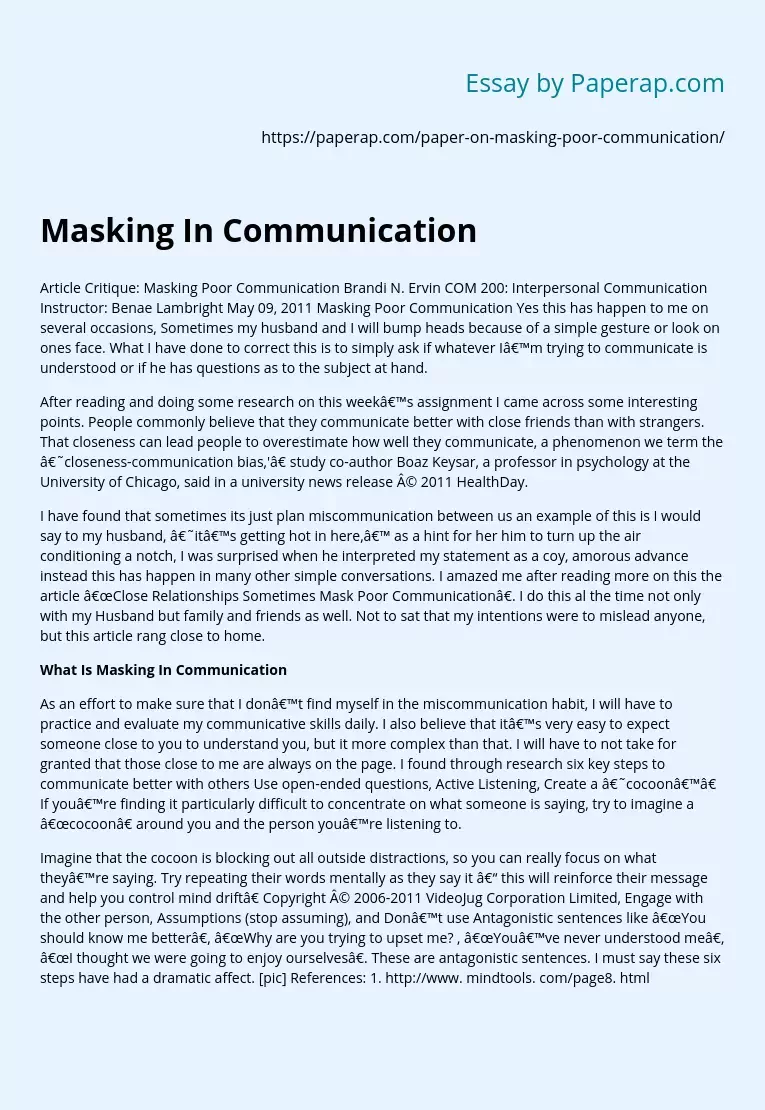Masking In Communication
Article Critique: Masking Poor Communication Brandi N. Ervin COM 200: Interpersonal Communication Instructor: Benae Lambright May 09, 2011 Masking Poor Communication Yes this has happen to me on several occasions, Sometimes my husband and I will bump heads because of a simple gesture or look on ones face. What I have done to correct this is to simply ask if whatever I’m trying to communicate is understood or if he has questions as to the subject at hand.
After reading and doing some research on this week’s assignment I came across some interesting points.
People commonly believe that they communicate better with close friends than with strangers. That closeness can lead people to overestimate how well they communicate, a phenomenon we term the ‘closeness-communication bias,’” study co-author Boaz Keysar, a professor in psychology at the University of Chicago, said in a university news release © 2011 HealthDay.
I have found that sometimes its just plan miscommunication between us an example of this is I would say to my husband, ‘it’s getting hot in here,’ as a hint for her him to turn up the air conditioning a notch, I was surprised when he interpreted my statement as a coy, amorous advance instead this has happen in many other simple conversations.
I amazed me after reading more on this the article “Close Relationships Sometimes Mask Poor Communication”. I do this al the time not only with my Husband but family and friends as well. Not to sat that my intentions were to mislead anyone, but this article rang close to home.
What Is Masking In Communication
As an effort to make sure that I don’t find myself in the miscommunication habit, I will have to practice and evaluate my communicative skills daily. I also believe that it’s very easy to expect someone close to you to understand you, but it more complex than that. I will have to not take for granted that those close to me are always on the page. I found through research six key steps to communicate better with others Use open-ended questions, Active Listening, Create a ‘cocoon’” If you’re finding it particularly difficult to concentrate on what someone is saying, try to imagine a “cocoon” around you and the person you’re listening to.
Imagine that the cocoon is blocking out all outside distractions, so you can really focus on what they’re saying. Try repeating their words mentally as they say it – this will reinforce their message and help you control mind drift” Copyright © 2006-2011 VideoJug Corporation Limited, Engage with the other person, Assumptions (stop assuming), and Don’t use Antagonistic sentences like “You should know me better”, “Why are you trying to upset me? , “You’ve never understood me”, “I thought we were going to enjoy ourselves”. These are antagonistic sentences. I must say these six steps have had a dramatic affect. [pic] References: 1. http://www. mindtools. com/page8. html 2. http://www. videojug. com/film/how-to-talk-to-people-better-communication-skills 3. http://proquest. umi. com/pqdweb? ReqType=301=0GSM3D4P8S=WELCOME=1
Masking In Communication. (2019, Dec 05). Retrieved from https://paperap.com/paper-on-masking-poor-communication/

